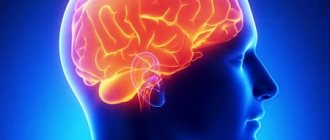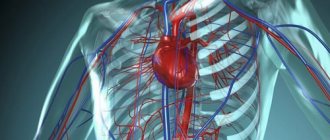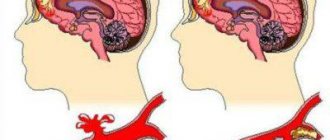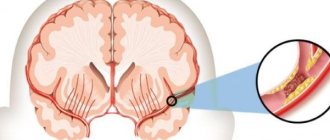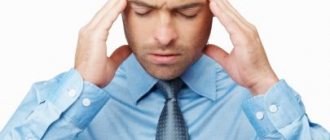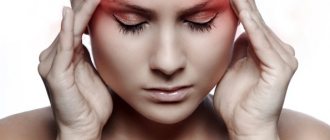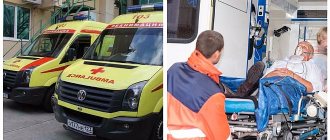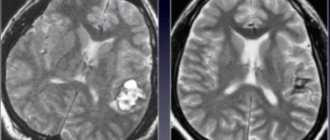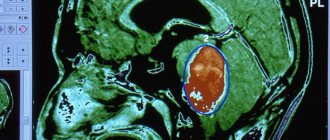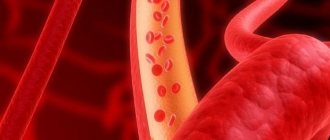What pills to take for a concussion and how long does it take to fully recover, how to provide first aid - these are the first questions for victims with a head injury. Traumatic brain injury (TBI) is one of the most common injuries that a large number of people face every day.
Treating a concussion at home is strictly not recommended. Taking medications without a prescription from a qualified specialist can cause complications and lead to serious consequences, which can then be very difficult, and in some cases even impossible, to reverse. The first thing to do if you have a concussion is to seek medical help. The sooner the patient is hospitalized in the hospital, the sooner and more effectively he can recover.
What is a concussion?
A concussion is a mild form of brain injury. One of the most common and frequent injuries in the system of traumatic brain injuries. The main thing to remember during a concussion is calm and good, restful sleep. Very often, a concussion is confused with a more serious injury - a brain contusion. If such an injury occurs, the patient urgently needs to be hospitalized and begin a course of drug treatment. Regardless of the severity of the blow, it is necessary to visit a doctor afterward in order to rule out the possibility of serious brain damage. To do this, you need to go for an x-ray and take a picture. With its help you can see if there are cracks in the skull or hemorrhages. After this, undergo examination by a neurologist. The symptoms of a concussion are quite broad and include:
- State of weakness, increased sweating, pale skin;
- Not precise concentration of gaze;
- Dizziness, pain, nausea accompanied by vomiting;
- Poor reaction, incorrect answers to questions asked;
- Disorientation in space and time;
- Loss of appetite and high body temperature;
- Possible fainting for a short time;
- Fatigue, insomnia;
- Disruption of the circulatory system.
In addition, damage levels can also be distinguished. There are only three of them:
- At the first level, fainting occurs, but after half an hour everything returns to normal.
- At the second level, some disorientation in space and time may appear. This phenomenon also disappears after half an hour.
- At the third level, the victim may lose consciousness for a short amount of time with partial memory loss.
Treatment of concussion with medications
After a person has a concussion, he must be urgently hospitalized and examined. Then the specialist makes a decision to leave the patient in the hospital or to place the patient on bed rest at home, following a course of drug therapy. To examine the damaged areas and make an accurate diagnosis, the patient must undergo certain procedures, namely:
- Electroencephalogram;
- CT and magnetic resonance imaging;
- Ultrasound examination;
- Obtain an X-ray of the head, neck and spine;
- Consult an ophthalmologist.
Often, for a concussion, certain medications are prescribed that relieve symptoms, reduce pain and restore the functioning of all internal processes. These primarily include neuroprotectors. Some of the most popular and effective medications are nootropil or piracetam. The adult dose of the drug is 1.2 g several times a day. In addition, specialists prioritize the following drugs:
- Somazine is used intravenously in the form of a physical solution.
- The antioxidant is also administered intravenously. Actovegin or Mildronate are often used.
- The dehydrant is taken in tablets.
- Kaviton stabilizes the function of the vascular system.
- Vitamins, namely group B, folic acid, phosphorus for the general tone of the body.
- If you have severe headaches, nervous disorders, or insomnia, take sedative medications. The most effective are adaptol and dormiplant, as well as their analogues.
The listed drugs are necessary in order to heal the body after a concussion of any degree, but it is worth immediately noting that you should not treat yourself, because if you select the wrong dose, you can only aggravate the situation and harm yourself. First of all, get a full diagnosis at the hospital from specialists.
Rehabilitation of the victim after injury
In case of a concussion, that is, the presence of obvious symptoms, the SPM team should be called. Before the arrival of doctors, the victim can, if necessary, be provided with qualified assistance:
- Place the patient on a hard surface, only horizontal.
- Turn your head to the side, this will prevent swallowing of the tongue and the penetration of vomit into the lungs.
- If there are no fractures, bend your right leg and place your hand under your head.
- In case of obvious damage, treat the injured area with an antiseptic and iodine.
You should also take medications for traumatic brain injuries after you are discharged from the hospital. To eliminate possible consequences, the patient is recommended to adhere to a certain regimen:
- full sleep 8-10 hours;
- constant flow of oxygen;
- optimal air temperature – 18-20 degrees;
- exclude heavy foods, chocolate, coffee and carbonated drinks;
- do not drink alcohol;
- stop smoking;
- To maintain muscle tone, light exercise is recommended (biking, swimming, exercise therapy).
Treatment of traumatic brain injury can be carried out at home, but only after a comprehensive examination and consultation with a neurologist. Based on the results obtained, the doctor prescribes appropriate therapy, including taking pills and other effective procedures aimed at restoring the functioning of the brain and its basic functions.
The head is an important part of the whole body and the entire organism as a whole, without proper work, a person will not be able to lead a normal life. Therefore, when the first alarming symptoms appear after a blow or injury, you should call an ambulance as soon as possible, undergo a full examination and begin competent treatment.
At the first symptoms of a concussion, it is necessary to call an ambulance team. To help the victim before her arrival, the following measures must be taken:
- place the patient on a horizontal hard couch;
- turn your head closer to the ground to prevent vomit from entering the respiratory organs;
- if fractures of the limbs and spine are excluded, place the patient on his side, bending his knee, placing his hand under his head;
- For abrasions, treat them with antiseptic and iodine.
Medicines for concussions are prescribed necessarily. However, the treatment regimen and groups of medications are determined depending on the clinical picture and general condition of the body.
The doctor’s decision regarding the prescription of medications is influenced by:
- The degree of complexity of the injury (mild, moderate, complex).
- Concomitant brain diseases.
- Age of the victim.
- The presence of consequences (vomiting, amnesia, migraines, etc.).
Medication is recommended for symptoms:
- loss of consciousness;
- impaired motor coordination;
- nausea, vomiting;
- a sharp rise in temperature;
- blood pressure surges;
- vision problems;
- headache.
How to treat the pathology and its consequences is decided solely by a specialist. As a result of a head contusion (traumatic brain injury), a hematoma can form, blood vessels rupture, tissue necrosis begins, etc., therefore, before starting therapy, the doctor must send the victim for diagnostics (X-ray, MRI, CT, electroencephalogram and ultrasound). Only after determining the complete picture of the condition of the organs and tissues inside the skull can any medications be prescribed.
Therapy is possible only after diagnosis
It is necessary to take medications for TBI even after treatment in a hospital setting. Following all the doctor’s recommendations will help prevent the development of possible complications after a concussion:
- long sleep – 8-10 hours;
- airing the room at night;
- temperature: 18-20 degrees;
- refusal of heavy meals, chocolate products, caffeine, lemonade;
- a drinker should avoid alcoholic cocktails;
- light physical activity: walks in the fresh air, visiting the pool;
- therapeutic and preventive physical education;
- physiotherapeutic procedures;
- use of drugs for medical reasons;
- acupuncture.
Complex therapy for a concussion will be successful if the victim receives appropriate treatment in a timely manner, following all the neurologist’s instructions. It is also necessary to maintain the patient’s mental and emotional state, to avoid stress and increased stress.
After an injury, light nutrition is necessary
In some situations, after a severe stage of damage to the “gray matter,” functional disorders of memory, attention, increased irritability and anxiety, dizziness and migraine attacks may occur. In severe forms of TBI, epileptic seizures and convulsions may occur.
A mild concussion, as a rule, has no consequences and in most cases does not require treatment or medication. Acute forms of the pathological condition can make themselves felt throughout the year, then these symptoms smooth out and completely disappear.
Self-therapy for a concussion is acceptable, but subject to a preliminary comprehensive examination. The neurologist will prescribe a special regimen, recommend how to treat the disease, which pills are best to take. Self-therapy should be abandoned, since improper use of medications can negatively affect a person’s health.
If you suspect an injury, consult a doctor
The head is an important part of our body; without the systematic functioning of the brain, normal activity is impossible. At the first symptom of a serious traumatic brain injury, you must urgently consult a doctor and take appropriate measures. In the absence of adequate proper treatment, various consequences may develop that can complicate the life of the victim.
Even a minor head contusion can provoke the development of serious complications if assistance is ineptly provided to the victim or if it is completely abandoned. The appearance of the above symptoms after an injury is an indication to call an ambulance. While the team arrives at the scene, a number of other actions should be performed.
If you suspect a concussion, you should:
- Place the victim on a flat, hard surface, placing a low pillow or cushion under the head. If spinal injury is excluded, it is better to turn the patient on his side to prevent asphyxia by vomit. Otherwise, you need to at least turn his head to the side as much as possible;
- eliminate sources of noise and bright light, provide free space around and an influx of fresh air;
- If possible, collect information about the circumstances of the injury, well-being, and sensations;
- not letting the patient fall asleep by constantly talking to him;
- monitor breathing rate, pulse, and skin condition;
- If you lose consciousness, try to revive the person using water or ammonia.
If signs of a concussion appear after a traumatic brain injury, it is better to refuse to transport the victim yourself. Before the ambulance arrives, it is better to disturb him as little as possible so as not to create a nervous environment. The patient should not be given water or food, as this may cause vomiting.
Properly conducted rehabilitation is the key to a complete recovery after a TBI. Many people stop using therapeutic methods too early due to the rapid disappearance of alarming symptoms. In fact, tissue repair takes longer than it seems. Returning too quickly to normal life is fraught with the development of complications such as chronic headaches, sleep disturbances, weather dependence, migraines, fatigue, and mental changes.
Rehabilitation
The timing of taking medications and their dosage are determined by the attending physician. You should not refuse drug therapy after relief occurs in the hope that the body will cope with the rest on its own. It is better to complete the full course to avoid negative consequences.
Rules for the recovery period:
- night sleep 8-10 hours, refusal of daytime rest, unless otherwise recommended by a doctor;
- regular ventilation of the room, walks in the fresh air after ending bed rest;
- maintaining the room temperature within 18-20°C;
- refusal of alcohol, coffee, carbonated drinks, cocoa chocolate;
- eliminating the effects of tobacco smoke on the body.
Depending on the degree of brain damage and its consequences, the patient may be recommended sessions of massage, physiotherapy, and exercise therapy. If during the rehabilitation period new symptoms appear or old ones increase, you should immediately consult a doctor.
Intense physical activity is included in the treatment regimen after all alarming signs disappear in the patient. If the condition is satisfactory only at rest, then exercise therapy techniques should be as gentle as possible. Treatment begins with breathing exercises. Next, passive or active movements of the limbs are connected to it.
Medications for adults for concussions
When a concussion occurs in an adult, it is very important to avoid the use of heavy and aggressive drugs. The main purpose of the medications is to stabilize brain function, relieve headaches, dizziness, restore proper sleep, remove anxiety and other unpleasant symptoms. For adults, an analgesic, sleeping pill or sedative in tablet form is perfect. Intramuscular injections are less common. In order to relieve headaches, you can drink analgin, maxigan, pentalgin and other analogues. These same drugs are also suitable for relieving dizziness. Additionally, you can drink betaserc, belloid or papaverine. To calm a person, motherwort, carvalol, and valerian are used. When symptoms increase - an anxious feeling occurs, the doctor prescribes one of the tranquilizers - phenazepam, elenium, rudotel, sibazon or nozepam.
Tranquilizers
Tranquilizers are psychotropic drugs of artificial origin. Relieves increased anxiety, phobic disorders, relieves increased convulsive state.
Drugs in this group are rarely used for concussion. But according to indications, the doctor will prescribe:
- Diazepam;
- Afobazole;
- Nozepam;
- Relanium.
Medicines reduce the level of daytime activity and concentration, improve and deepen sleep.
Medications for concussions in children
It is exciting and scary for every parent when their child gets a concussion or even a simple bruise. In any case, the child needs to be examined by a specialist. It is best for an ambulance to take the child to the hospital, where he will be examined by a neurosurgeon or neurologist. If minor symptoms are observed, this does not mean that the damage is not severe. With a cerebral hemorrhage, the child may not even feel anything, and the damage will progress, the condition worsening over several days. The child experiences a change in behavior, he is excitable, he feels nauseous and vomits, he often falls asleep, and his consciousness is depressed. If there is an open wound on the head, it must be treated first. Create a calm atmosphere for your child. It is necessary to hospitalize the baby. This is necessary in order to monitor, under the supervision of specialists, whether the damage process is progressing, whether intracranial hematomas or epilepsy will appear. Also in the hospital the child will be provided with psychological and emotional peace.
The course of drug therapy also has its own goals. It is necessary to prescribe medications that make the urinary system work. The most effective remedy is diacarb. In addition to it, potassium is prescribed. The main goal is to relieve swelling in the brain. In addition, sedatives are prescribed in order to restore the nervous system. In the presence of severe headaches, analgesics are prescribed. If the pain is accompanied by nausea, then cerucal is prescribed. Vitamin groups and nootropics, which improve metabolism, are also prescribed as preventive agents. If the condition does not improve, the child is sent for additional examination and procedures are prescribed in the form of tomography, EEG, neurosonography, etc.
Often the child gets better within a few weeks. The concussion ends without complicated symptoms, after which he can return to a normal, fulfilling life. You can take your child to a home environment after a couple of days. However, control at home should be tightened so that the child does not engage in physical activity for some time, or sit in front of the TV or other gadgets.
Other treatment recommendations
It is likely that after a concussion a person will have headaches for a certain amount of time. They have a different character - with a specific location, pulsating, but if their cause is not a problem with the vascular system, any migraine or neoplasm will be removed by simple painkillers. These include analgin, citramon - each drug is determined by a doctor or independently, taking into account the factor of an allergic reaction, the tolerability of certain components in the drug, etc. These same factors guide the choice of medications against dizziness. These include tanakan, belloid. A sedative may also relieve headaches. Together with a tranquilizer, any sedative (motherwort, valerian) has a significant effect after a concussion.
After visiting and consulting with a doctor, he may, in addition to drug therapy, prescribe therapy to treat blood vessels and the nervous system. This is necessary to improve metabolism, start the regeneration of neurons, and resume lost functions. Often, after a concussion, symptoms and consequences can manifest themselves in the asthenic sphere. In this case, Pantogam is prescribed 3 times a day, Cogita - once a day, or Vasobral - 2 times a day. Dosages are prescribed by the doctor himself. In addition, tonic medications in the form of ginseng, saparal, lemongrass and others will be quite effective. They need to be taken in small quantities, as an overdose causes headaches. A person who has been subject to a concussion should not drink coffee or use drugs, smoke or drink alcoholic beverages for some time.
To prevent sclerosis after injury in older people, doctors may prescribe a special course to reduce the risk of its occurrence. When healing an injury, it is necessary to monitor how the consequences progress in the form of concomitant chronological diseases, and treat them in parallel with the main course. It is worth noting that if the patient is prone to epileptic seizures, it is urgently necessary to put him under dispensary control. After you have suffered a concussion or some other injury, it is recommended to go on vacation and recover from the illness and injury.
Relaxing in the fresh air, walking a lot in the park or going out into nature, and having good, healthy sleep (about 7 hours) will be very useful. If the victim’s profession is sports, then unfortunately, he will have to turn his income into a hobby. Since the consequences of the damage will be expressed on your health, it may overtake you suddenly, for example, during training or competition. When spending time in sports, try to take care of yourself, wear a helmet and goggles on your head to protect your eyes. If you have a car, drive carefully, pay attention to the road, and do not get distracted in order to avoid accidents and sudden braking, which can subsequently lead to a head injury. Careful behavior on the street, while driving and in other cases can save your health and even life.
Taking into account the above medications and drugs, you can heal yourself and get rid of the unpleasant symptoms of a concussion in just a few days.
Diuretics
Treatment of a concussion involves the complex use of several groups of medications.
For the purpose of symptomatic therapy, the attending physician prescribes medications:
- Painkillers.
- Sedatives.
- Tranquilizers.
- Anticonvulsants.
- Antiemetics, etc.
For direct impact on the post-traumatic area:
- nootropics;
- diuretics;
- vitamins;
- vasotropic.
Any medications a person takes have an effect on the brain, so you should not decide on your own what medications to take for a concussion. Incorrect selection of the drug can lead to the most disastrous consequences.
To improve brain function
Painkillers
Due to injury, patients are often bothered by headaches that turn into migraines. To get rid of the pain, it is recommended to take pills that have an analgesic effect.
The following tablets can be taken for a concussion:
- Sedalgin.
- Analgin.
- Pentalgin.
- Maxigan.
The analgesic effect is aimed at blocking pain receptors in the brain, due to which the victim feels significant relief. The medication should be taken no more than three times a day.
Sedatives
Even if the victim is diagnosed with a mild concussion, the specialist prescribes sedatives that act on nerve receptors and have a calming effect.
The list of sedative drugs includes:
- Motherwort;
- Persen;
- Volocardin;
- Novo-passit;
- Corvalol.
Tranquilizers
Treatment for a concussion may include taking tranquilizers. Potent antidepressants are prescribed if the patient experiences excessive nervous excitability, insomnia and increased anxiety.
Preparations:
- Relanium.
- Nozepam.
- Phenazepam.
Tranquilizers can only be prescribed by the attending physician. Antidepressants are taken strictly as prescribed, as the pills can be addictive and have dangerous side effects.
The doctor will select the necessary tranquilizers
Anticonvulsants
Tablets that stimulate diuresis are taken to quickly detoxify the body; protein breakdown products are removed along with water. Diuretics in the early period after a concussion are prescribed to prevent the development of cerebral edema.
Uncontrolled use of these drugs leads to the development of dehydration, disruption of water-electrolyte and acid-base balance. Therefore, you should not take diuretics according to your “own” prescription and deviate from the recommendations of your doctor.

